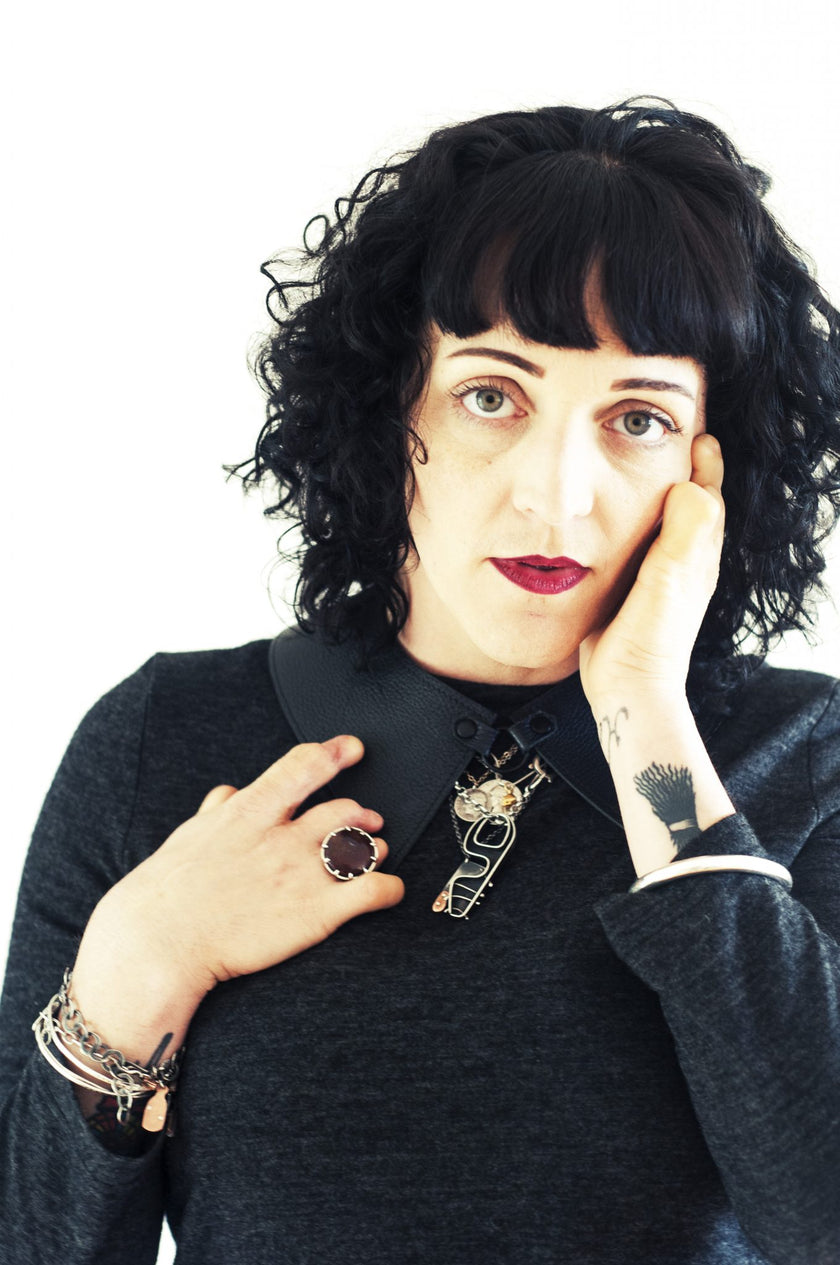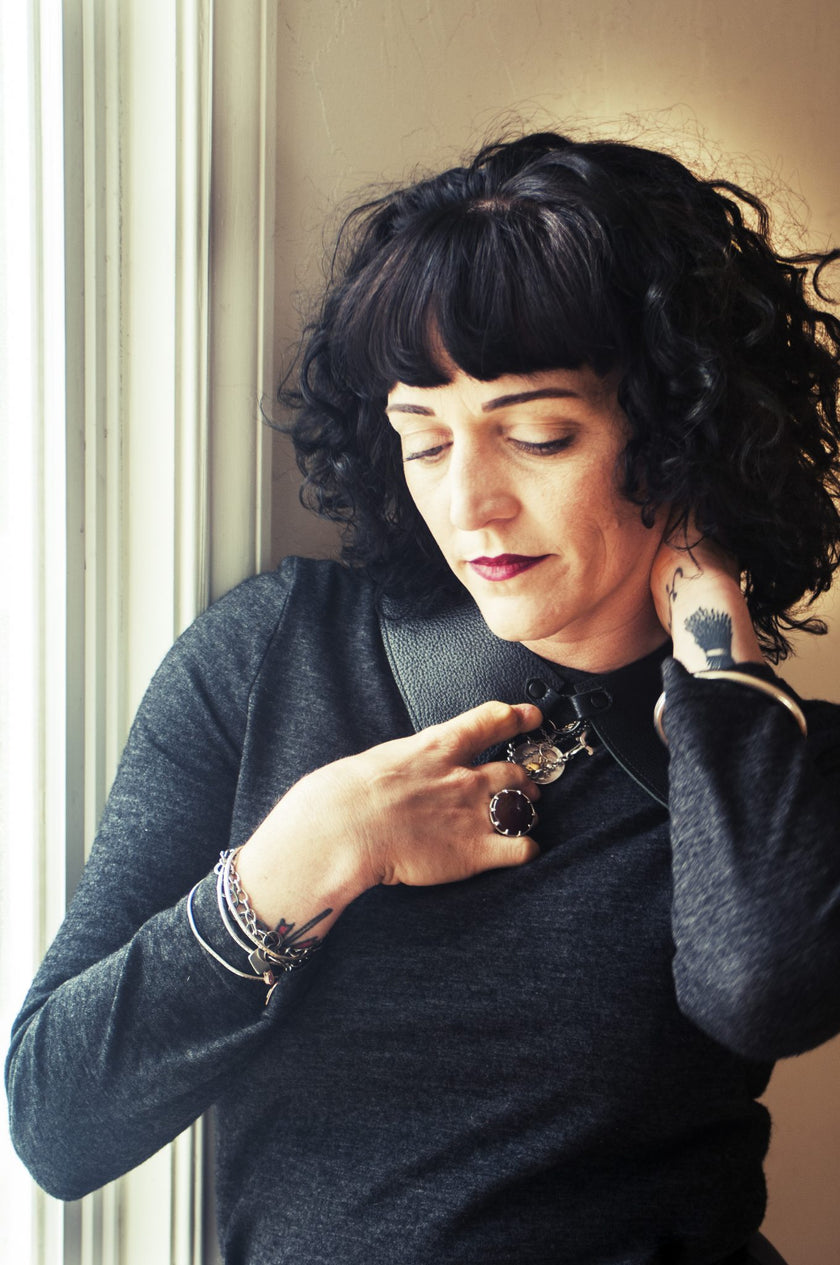Gritty Jewelry Final Sale 50% off applied at checkout! Starts at MIDNIGHT 1/28
Gritty Jewelry Final Sale 50% off applied at checkout! Starts at MIDNIGHT 1/28
0 0 0 : 0 0 : 0 0 : 0 0
Drawer menu

By Adam Gillick
I met Kimberly Merritt early in 2001 when she hustled coffee for that green smock corporation. She dabbled in vintage Volkswagen mechanics and lusted after Trent Reznor. She was patching together a proper Gen X life in Orlando. I found her bright, creative, and terminally buoyant. It took a few passes before I noticed anything else about her. She was crafty, always painting, or rebuilding carburetors, or cutting up metal trash cans into lamps. Discovering the contours of Kim’s hands was as neutral as discovering that the sweater you always thought was black is actually charcoal.
She hopes to bury some misconceptions about them and her abilities. Her hands are forever a part of her, but they don’t define nor instruct her. Our hands are tools and so are hers. Curiosity itself never bothered Kim, but a constant trickle cleaves a canyon over time. That says all that needs saying, but an abridged history might answer some questions.
Kim attempted a daring escape from her mother’s captive womb three months early. Medicine halted her flawed design, and she served out her remaining sentence. The drug that stymied her adventure, and likely saved her life, interfered with the skeletal development in her hands.
Most hands resemble refrigerator art turkeys. Kim’s hands don’t conform to such structure. She was born to rebel, and her hands prove it.
The hospital flooded Kim’s biological captor, Debbie, with drugs and broke the news. Her newborn baby had partially invisible sets of webbed fingers, and one thumb, you couldn’t see at all. They worried her with assurances that Kim would never function like other kids. She wouldn’t write or sport. They could maybe pluck a toe from one of her feet and sew it to her hand like a thumb, though. Kim was perfectly healthy in every other way; she just had different hands, and therefore was stamped, “disabled.” Debbie tuned into Kim’s vibe immediately, rejecting their offer and outlook. She bundled her daughter and marched her home.

Kim was a happy baby. Everything seemed about fine and proper to her. She grinned like a nerd in pictures, as babies are wont to do. She endured her first surgery before she could walk, and she spent ample time in hospitals throughout her childhood. They separated her fingers at webbed parts, and she gained some digit autonomy. It hurt, but a happy kid she remained. Kim is stubborn; maybe it’s her Taurus nature. She won’t let something lame, like a hand-to-bicep cast, piss on her parade. On any random day, she’d wake up determined to splash some Orlando mud, and would be damned if a ton of discomfort should stop her. On particularly painful days, I imagine Kim woke the house by yelling, “Where’s my morphine and grits?” Once her basic needs were met she hummed a swampy hymn.
She wasted no time in proving wrong the medical staff that birthed her. She colored in books and drew on her chalkboard. She wrote and nonchalantly held things. She went on to play softball. She accomplished everything any other kid her age did; she was woefully average that way. Some viewed that as an especially positive development. To Kim, it was just regular development.
Puberty and Happiness remain at war. Kim reached that special age where attraction and disdain gurgle to the surface and pollute the innocent ridicule of youth. Juvenile cruelty always pestered Kim. The preteen society marked her as a freak. But she spouted boobs, so the boys alternately mocked and lusted her. It was a weird time.
Her carelessness caved from the weight of depression and angst. She withdrew. She favored angry songs and bad poetry. She wrote sullen words and dreamed herself into a band. She created a strange/fun wardrobe from thrift store scores. But none of her peers seemed to care about Kim, the bright and blossoming artist. They only jeered Kim the weirdo or tried to squeeze her tits, and it was often both. Her faith in humanity plummeted. She dropped out of school and decided to hack her own crossing through the filth jungle of a supposed civilization.
Kim grew giddy for self-destructive behavior. It didn’t take long before she felt how hard and thorny the bottom of that pit gets. This wasn’t how Kim would die, not in such a pointless and unattractive way. Determined, she found any handhold she could and dragged herself out of the abyss. She transformed genuine trash into decorations and lighting fixtures.


Beyond professional caffeine, Kim cleaned houses and framed art. She took money for cleaning, but honestly, she just loves to scrub. Her fondness for bulky, weighty objects attracted her to metal. She signed up for metalworking classes and completed the coursework, advancing her roadway carnage prowess. Her tool collection grew, and she stocked up on raw metals and gems.
Over the following decade, Kim honed her jewelry craft, moved to Seattle, and founded Gritty Jewelry. She planted roots and spread, setting up booths at craft fairs and music festivals, consigning and wholesaling through independent boutiques, and fielding questions from a few art & style publications.
Today, you can find Kim sitting behind her bench in Lake City, sawing, soldering, and showing art seekers around her private studio, If she’s absent, then she’s out getting tattooed or stomping a dancefloor. The topic of her hands comes up often, and she navigates the subject with respectful concision. She prefers to ignore it because it’s a moot point. Nothing prohibits Kim doing anything.
Some actions challenge her, though. The inventor of the shampoo pump wins her affection. Dropping a dime requires a cost benefit analysis. She usually saves money by abandoning the coin, returning to her bench, and sawing out another charm. But the hardest challenge for Kim is when people refer to her as handicapped. She would rather endure a week-long road trip with an enthusiastic Bible merchant than suffer another compliment about how capable she is, “considering her circumstances.”